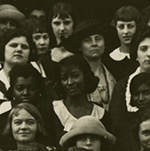 University Library
What She Said
University Library
What She Said
Part II: Women Together
Part III: Issue Spotlights
 University Library
What She Said
University Library
What She Said
Part II: Women Together
Part III: Issue Spotlights
In the 19th century, the provision of childcare was generally viewed as women’s responsibility. As increasing numbers of women found work outside the home, the need for childcare became a pressing issue. The Lanham Act passed in 1943 in response to women working in factory and other jobs left vacant by men fighting in World War II. It provided federal financial support for childcare centers administered by school districts. Southern California early childhood education leader Rosalie Blau used Lanham Act funds to run the Woodland Child Care Center.
At the end of the war, federal funds were withdrawn, though the idea of childcare as a woman’s responsibility remained. In 1971 Congress passed the Comprehensive Child Development Act. President Nixon vetoed it, and the Revenue Act instead framed childcare as a private responsibility of nuclear families. It classified childcare as a personal living expense, and established incentives for domestic work instead of day care centers. On a local level, the League of Women Voters and Los Angeles City Councilmember Joy Picus advocated for the creation of the Los Angeles Mayor’s Advisory Committee on Child Care in the 1980s.
Beginning in the late 1960s, some corporations began to offer childcare as a way to reduce female worker turnover and absenteeism. Despite limited success, the practice has not been widely adopted, leaving many families struggling to find affordable childcare as the federal government frames it as a class-specific social-service program. By the close of the 20th century a number of funding models and strategies provided limited assistance, but left many issues unresolved.
You've reached the end of the audio tour for the What She Said exhibit. Thanks for listening! We hope you enjoyed spending time here today. Special Collections & Archives materials, like those you've seen on display in the gallery, are available for everyone to use. Visit Special Collections & Archives to learn more.
1
Photograph Album, The May Co. Playroom, 1938Rosalie M. Blau Collection
2
Bulletin, "California Program for the Care of Children of Working Parents," August 1943Rosalie M. Blau Collection
3
Photograph of Rosalie Blau teaching at Woodland Child Care Center, 1944Rosalie M. Blau Collection
4
Bulletin, "Employed Mothers and Child Care," 1953Rosalie M. Blau Collection
5
Brochure, "National Conference on Day Care Services," May 13-15, 1965Rosalie M. Blau Collection
6
Brochure, "What is Good Day Care?" 1964Rosalie M. Blau Collection
7
Report, "Child Care Arrangements of the Nation’s Working Mothers: A Preliminary Report," 1965Rosalie M. Blau Collection
8
Mayor’s Child Care Advisory Committee Statement of Purpose, circa 1985League of Women Voters of Los Angeles Collection
9
Letter from Zev Yaroslavsky, Los Angeles City Councilman to Etta-Belle Kitchen, President of the League of Women Voters of Los Angeles, regarding the City of Los Angeles Child Care Policy proposed by Councilwoman Joy Picus, March 11, 1987League of Women Voters of Los Angeles Collection
10
Child Care Pilot Study, "Consumer’s Guide to Child Care," June 1976Rosalie M. Blau Collection
11
"Day Care: Who’s Minding the Children?" Newsweek, September 10, 1984California Association for the Education of Young Children Collection
12
"Ten Child Care Policies You Can Implement Tomorrow," circa 1980-1995League of Women Voters of Los Angeles Collection
13
Brochure, "Your Company Doesn’t Have to be one of the Fortune 500 to Afford a Child Care Policy," circa 1986-1995League of Women Voters of Los Angeles Collection
